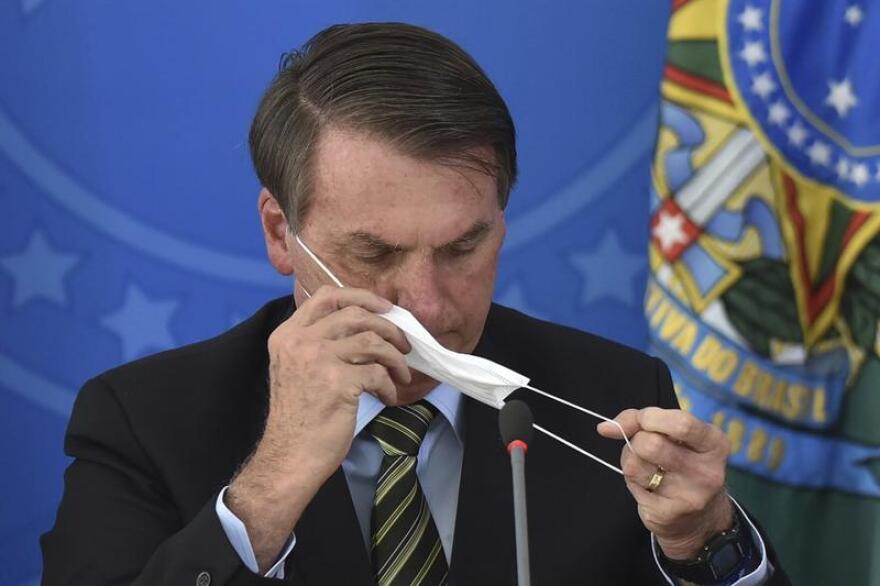COMMENTARY
On the opening page of his guerrilla memoir "Fire from the Mountain," Nicaraguan revolutionary Omar Cabezas calls his birthplace "a ghost town” during Semana Santa, or Holy Week, because everybody bolts for the countryside or the beaches to congregate and party.
This is Semana Santa, the week before Easter, and Nicaragua is still congregating and partying – in spite of the COVID-19 pandemic that's killed almost 90,000 people worldwide.
WLRN is committed to providing South Florida with trusted news and information. In these uncertain times, our mission is more vital than ever. Your support makes it possible. Please donate today. Thank you.
Throughout Latin America, this is is supposed to be the Semana Santa of social distancing. Semana Santa as Semana Sana – Holy Week as Healthy Week. But in Nicaragua, President Daniel Ortega and his Vice President wife, Rosario Murillo, are telling their countrymen to treat COVID-19 like Mardi Gras. They’ve held festive, pro-government street marches to show the world their poor Central American nation isn’t afraid of the new coronavirus that’s now claimed its first victim there.
READ MORE: Bolsonaro Oblivion: Why Brazil's COVID-19 Future Is Likely Worse Than It Looks
That recklessness could lead to mushrooming infection. But what’s also troubling to realize, especially during Semana Santa, is that the recklessness has religious roots – not just in Nicaragua but across the Americas.
First a disclaimer: this is not an anti-religion or anti-evangelical rant. I’m a Roman Catholic, and I respect the redemptive tenets of evangelical Christianity. But among Catholics, evangelicals, Jews, Muslims or any faith group, there are folks who go off the rails. And in the time of coronavirus, derailed evangelicals have been stoking most of the dangerous corona-denial in this hemisphere, from Miami to Managua to Manaus.
All faith groups have folks who've gone off the rails – and from Miami to Managua to Manaus, derailed evangelicals have stoked most of the dangerous coronavirus denial in this hemisphere. Why?
Politically and seemingly religiously, Ortega and Murillo are tightly allied with that crowd. (Not coincidentally, their conversion came after the Roman Catholic Church dared to criticize their deadly human rights abuses.) It may be the biggest reason Nicaragua is the only Central American nation that hasn’t issued a COVID state of emergency – even though its health ministry has warned thousands of people could become infected in a country that has a grand total of 160 hospital ventilators.
But why flip the biblical bird at the corona-safeguards in the first place? It's about more than mere claims of religious freedom. It's also because, in the particular evangelical current Ortega and Murillo have decided to swim in, surrendering to scientific warning is a mark of spiritual weakness.
When the corona-plague took hold in the U.S. last month, extremist evangelical pastors like Guillermo Maldonado of the King Jesus megachurch in Miami called fear of COVID-19 “a demonic spirit.” Maldonado only recently agreed to stop holding large, in-person services – though he still could since conservative Florida Governor Ron DeSantis has exempted churches from coronavirus lockdowns.
So has Brazilian President Jair Bolsonaro, who spouts so much COVID-denial he makes Donald Trump sound as responsible as Dr. Anthony Fauci. Bolsonaro’s own political base is heavily evangelical, and pastor Silas Malafaia got him to declare last Sunday a day of national prayer so Brazil could “free itself of this evil.”
A month of national quarantine would have been more effective: since Sunday Brazil has seen 6,000 new COVID-19 cases and 350 more deaths.
PROSPERITY THEOLOGY
Bolsonaro’s chief gripe about social distancing is its harmful economic impact. And that worldly consideration also occupies the sort of evangelical mindset he’s hooked up with.

One reason so many Latin Americans have ditched the Catholic Church for evangelical churches is that the latter look out for their wallets as well as their souls. They’re as good at seeding businesses as they are at filling pews. Which is great. But from that comes what’s known as “prosperity theology,” the belief that getting rich is part of God’s plan for the faithful. Anything that challenges that divinely decreed dough is, well, “demonic.”
To more mainstream Christians that’s a denial not just of the COVID-19 threat but of the basic spiritual principle of accepting hardship and sacrifice for the good of others. As a Catholic I have doctrinal disagreements with Miami Archbishop Thomas Wenski; but I applaud his decision to keep South Florida’s Catholic churches closed for Easter – and his theological as well as epidemiological reasons for making it.
“The gospel is not about wealth and prosperity,” Wenski told WLRN’s Danny Rivero this week. “Those that are saying if you have enough faith the virus will not get you, well, that’s not the tradition of the Christian faith.”
Which is why Semana Sana is indeed about ghost towns – not because we’re heading for our beaches, but because we’re staying in our houses. For the good of others.




